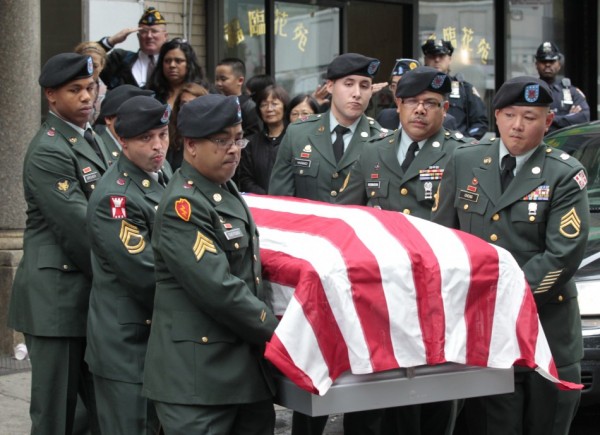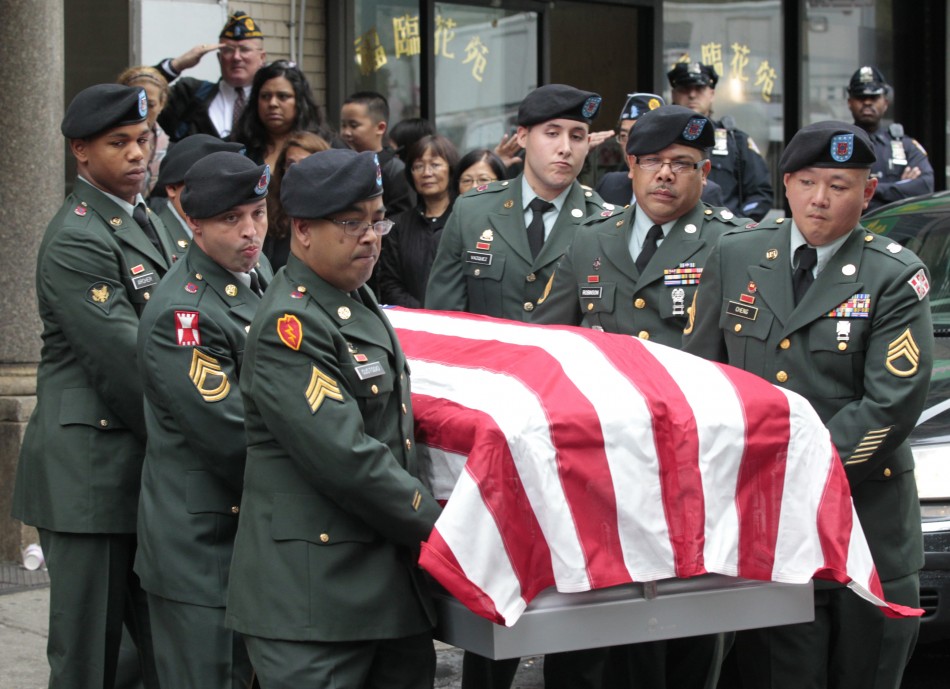
This article was originally posted on ryansappa and has be reposted here with permission.
By Daniel Kim
The subtitle to this should be “The Death of the NCO [Non-commissioned officer] Corps.” This is a post I didn’t want to write, if only because of certain memories I knew it would stir. I’ve thought, what could I possibly have in common with two kids half my age, whom I’d never met, and who killed themselves in the place “where empires go to die?” Quite a lot, actually, and it took another person I’ve never met to help me see the similarities. Thank you for that, Captain Srinivasan.
Here I’ll concentrate more on Army Private Danny Chen than Marine Lance Corporal Harry Lew, mainly because the allegations of what happened to Lew, while shocking, are far less egregious than what happened to Chen. This doesn’t make the situation surrounding Lew’s suicide less tragic by any means. I’m no apologist for the Marines who hazed Lance Corporal Lew, but you just don’t fall asleep on guard duty while you’re in enemy territory, which could potentially jeopardize your unit. You might deserve some punishment and extra duties or training, but as corrective action, not demeaning like what Lew had to suffer.
No one who has ever spent any amount of time in the infantry (not the 2 million or so in all ranks in all services, but the roughly 5% of those who fight their enemy in what we euphemistically call “close combat”) will tell you that it’s easy. Far from it, and we even had a darkly funny motto: life is hard, welcome to the infantry, wear your helmet. We take pride in marching 12 miles with a rifle, helmet, and rucksack in less than three hours, training unrelentingly during field exercises with live ammunition, hitting 36 out of 40 targets out to 300 meters away with an M4, knowing by heart all nine lines of a medical evacuation request. As one of the few all-male specialties in the Army and Marine Corps, this is a place for Type-A personalities who lead either by personal example or “size 11 motivation,” occasionally both, though leadership by screaming is not unheard of. The infantry is not for the imaginative, physically or mentally weak, or faint-hearted; this sort is usually culled in a pitiless military Darwinism before deploying, and might find gainful employment in a support specialty. It is an unforgiving environment where strength and physicality are valued and respected, but also remarkably welcoming once you’ve proven yourself. One of the proudest moments of my infantry career is when I was first called a “mother******,” the ultimate term of endearment and acceptance.
Let the “pogues” (People Other than Grunts) have their sprawling forward operating bases (FOBs) with air conditioning, dining facilities with salad bars and soft-serve ice cream, shuttle buses, even Starbuck’s and Pizza Hut. The average infantry soldier or Marine lives outside the FOB, sustained by only what he can carry in his assault pack, not even bathing or brushing his teeth because that precious water will be needed for drinking; besides, water is heavy, trust me. It’s almost a Lord of the Flies existence, but by necessity. The weak link who can’t meet the unit’s standard for push ups, or falls out of a five-mile run in garrison, might not have the stamina or intestinal fortitude to carry a wounded 200-pound mate out of the line of fire. That under-performer might not be able to hike over two mountains with a 100-pound pack, plus 60 pounds of body armor and ammo and weaponry, then engage the enemy in a firefight at the end of the march, when he’s so tired that his very bones hurt. We are not the heroes of a Tom Clancy whiz-bang high-tech thriller, and we will never kill someone with our bare hands like some ninja or super-spy. We’re the guys with uniforms so nasty they could stand up by themselves, who would fight with our teeth and toenails to keep the boys in our platoon alive, who fight secure in the knowledge that the guy next to us will, if need be, take a bullet for us.
I mention all this because it informs non-infantry people what “grunts” do for a living. It isn’t all dress green (now blue, alas) uniforms, drill and ceremonies, or even the now-passé tradition of shined boots. Let’s also not forget, most importantly, that anything deemed out of the ordinary, not “normal” for that unit or in that moment of time, is easy fodder. This appears to be what happened to Chen in an almost all-white unit. For Asian American soldiers like me, it could mean getting pummeled by good ol’ boys at the Hidden Door bar at Ft. Benning, GA, because they could, and because I wasn’t one of them, a white Southerner. It could mean the snide or malicious comments that many of us withstood for years, because we actually exceeded their low expectations of any Asian American soldier. As much as I hate quoting my father, he was right in that you have to be better than them, for them to see you as an equal. And when that happens, as it did for me (mostly), I just became Sergeant Kim and that was the end of it.
I see young Chen, and see myself twenty years ago. Maybe not the best runner, maybe not the most tactically or technically proficient, but certainly not the worst and deserving of the treatment he received. From all accounts, he was, like me, a kid who tried, and could have only gotten better with time and better mentoring. Thankfully, I was never hazed because of my race; many of the noncommissioned officers (NCOs, corporal and above) who brought me up were either black or Hispanic, and didn’t have the time to tolerate such stupidity in their units. This didn’t prevent the odd bar fight here or there, but that was always off-post, never part of any official duties. What this signified, at least to me then, was that it was just a few knuckleheads – not the US Army as a whole. Once I became an NCO myself, I hardly ever encountered it, and would come crashing down on anyone who tried to mess with an Asian American “joe,” or junior soldier.
And that brings me (finally) to the point of this post: where were Chen’s NCOs? Digging deeper, what happened to what we call the NCO Chain of Support, which is supposed to mirror the Chain of Command and be a guiding/calming force for any unit? The closest civilian analogue I can think of is that of a foreman vs. manager when describing NCO vs. officer roles within a unit. When I first became an NCO, I had to learn this creed by heart, and I still have that in me as much as the Ranger Creed. As one of my instructors at “Sergeant School,” or PLDC, said, the first stanza of the NCO Creed differentiates us from any jumble of so-called sergeants as can be found in most of the world’s militaries. At the risk of sounding like an old fogie retired soldier, NCOs took pride in being NCOs in my day. We would think nothing of ensuring our words and actions could only be perceived as the standard to which our junior soldiers should aspire. If I maxed the push ups in the physical fitness test, I expected my joes to match that; if my joes didn’t have the skills or knowledge they needed, then I as their NCO and primary trainer was responsible. What happened, then, that there are no less than four NCOs among the eight charged in Chen’s death?
From the available sources, it seems as if the NCOs in Chen’s unit either turned a blind eye or took an active part in what might have started as hazing, but became infinitely more sinister and crushing. Indeed, Chen’s entire platoon chain of command, from team leader to squad leader to platoon leader, has been charged in his death. If the charges prove true, that begs a deeper question. Above the platoon, which is roughly 30 soldiers led by a lieutenant and a midlevel NCO, comes the company. The company can have three or four platoons, is led by a captain and a senior NCO, and if a platoon can be likened to a family, then the company is your extended family and the battalion is your clan. And nothing happens in 2nd Platoon that you don’t eventually hear about in 1st or 3rd, even if the platoons are separated by up to ten kilometers and live on separate FOBs.
Since this is the case more often than not, I would like to see if the company’s commander and first sergeant are or are not being held accountable along with the 8 men who’ve been charged. If a platoon leader and platoon sergeant, the two most senior men in that subunit, are charged, then wouldn’t it be fair to assume that their superiors, the commander and first sergeant, had some inkling of what was happening? They are, after all, responsible for the company as a whole, which included Private Chen’s platoon. Above even them are the battalion’s commander and command sergeant major, each with up to twenty years’ service and supposedly old enough to remember what goes on at the platoon level. Who are they and will there be any kind of accounting for their actions or inaction?
Soldiers and former soldiers talk about a “failure of leadership” all the time. I’d heard of such failures, but had never seen one or read about one until now. If my boy were to follow in my footsteps and join the Army, what should I tell him about the leadership of the service I still cherish? What should I tell him about the service I love, which allowed this utter failure of leadership that leaves me sad and disappointed? Should I, twenty years hence, tell him to be twice as good to be seen as a white soldier’s equal? Should I tell him to become an officer so that he won’t have to experience anything like Chen or Lew as a junior enlisted man, and in doing so perpetuate the endless Asian American class discrimination against enlisted folks? Or will he, as I did, not worry about all that, and serve his country anyway?
ABOUT DANIEL: I served in the US Army infantry for 12 years, got out as a staff sergeant, and that informs who I am. I’m also a husband and father. Professionally, I run restaurants for a living, and even briefly owned my own.
- Excited
- Fascinated
- Amused
- Disgusted
- Sad
- Angry








